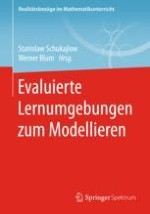2018 | OriginalPaper | Buchkapitel
9. Beyond Lip Service: Sustaining Modelling in Curricula and Coursework
verfasst von : Prof. Dr. Peter Galbraith
Erschienen in: Evaluierte Lernumgebungen zum Modellieren
Verlag: Springer Fachmedien Wiesbaden
Aktivieren Sie unsere intelligente Suche, um passende Fachinhalte oder Patente zu finden.
Wählen Sie Textabschnitte aus um mit Künstlicher Intelligenz passenden Patente zu finden. powered by
Markieren Sie Textabschnitte, um KI-gestützt weitere passende Inhalte zu finden. powered by
